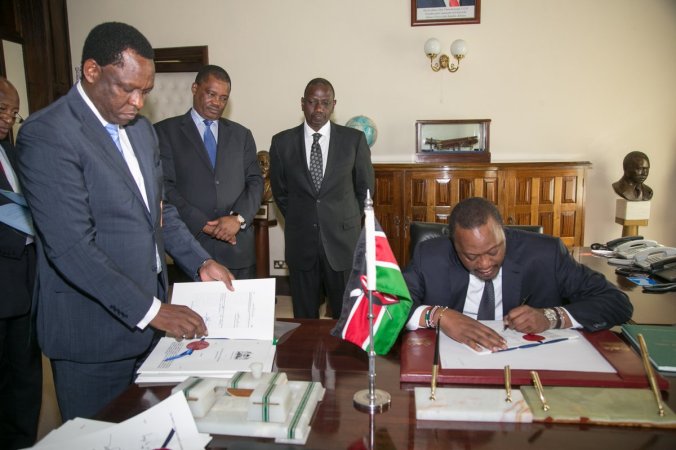
This blogger has received official confirmation that the Statute Law (Miscellaneous Amendments) Bill, 2014 passed by the National Assembly on 13/08/2014, was assented to by the President of the Republic on 28/11/2014 thereby bringing the Anti-Counterfeit (Amendment) Act 2014 into force. The Bill has effectively amended four sections of the Anti-Counterfeit Act, namely sections 2, 6, 16 and 34. A copy of the Bill is available here.
The Bill’s Memorandum of Objects and Reasons explains that the Anti-Counterfeit Act has been amended to “provide for the establishment of the Board to manage the Anti-Counterfeit Agency. It [The Bill] also establishes an Intellectual Property Enforcement and Co-ordination Advisory Committee. It [The Bill] also introduces a new provision empowering the Executive Director to compound offences committed under the Act.”
What follows is this blogger’s take on the recent amendments to the Act.
Section 2
This is an amendment by deletion. The words “or elsewhere” have been deleted in the definition of “counterfeiting” under the Act. The spirit behind this amendment appears to be based on the principle of territoriality in intellectual property law.
Unlike Kenya Copyright Board (KECOBO), the Anti-Counterfeit Agency (ACA) appears to have facilitated public participation and stakeholders’ consultations in the drafting of these proposed amendments. For instance, the ACA organised a Stakeholders’ Meeting on September 25, 2013 to deliberate on changes to the Anti-Counterfeit Act. However, health activists voiced their disappointment with the outcome of the meeting (See here) which later morphed into a full blown social media campaign dubbed #TellACABoss (See here).
Therefore this blogger reckons that the health activists will be disappointed once more with the amendment to section 2. The health activists have consistently maintained that the definition of counterfeiting under the Act creates ambiguity between ‘generic’ and ‘counterfeit’ medicines thereby threatening access to affordable and essential generic medicines. They hold that this definition in section 2 goes beyond what is legally required under the World Trade Organization Trade Related Aspects of Intellectual Property Rights (TRIPs), which Kenya has already domesticated into law. The activists have been emboldened in their calls for amendments to the Act by the landmark judgment in the case of Patricia Asero Ochieng and 2 Ors v The Attorney General. In this case, the judge held, inter alia, that:
“It is incumbent on the state to reconsider the provisions of section 2 of the Anti-Counterfeit Act alongside its constitutional obligation to ensure that its citizens have access to the highest attainable standard of health and make appropriate amendments to ensure that the rights of petitioners and others dependent on generic medicines are not put in jeopardy (…)”
Section 6(1)
This is an amendment by deletion and substitution. The new section is intended to set out the composition of the ACA Board of Directors. This amendment principally aims at reducing the size of the ACA Board and setting the minimum qualifications for private sector appointees to the ACA Board. Any private sector appointee is required to have at least one degree from a university recognised in Kenya and at least ten (10) years’ experience in matters relating to either intellectual property (IP) rights, consumer protection or trade.
The lean ACA Board will no longer include the heads or representatives from the Ministry of Trade, KECOBO, the Office of the Attorney General, Kenya Industrial Property Institute (KIPI), Kenya Plant Health Inspectorate Services (KEPHIS) and the Pharmacy and Poisons Board.
This blogger is in full support of these amendments as it promotes professionalism and good governance. The other IP agencies, KECOBO and KIPI, would be well advised to emulate ACA’s example with similar amendments to the Copyright Act and Industrial Property Act respectively.
Section 16(4)
This is an amendment by addition. Section 16(4) establishes a special committee known as the Intellectual Property Enforcement and Co-ordination Advisory Committee (IPECAC). IPECAC will be comprised of fifteen (15) members namely the Cabinet Secretary for Industrialization and Enterprise Development who will be the chair and fourteen members drawn from various state agencies involved in protection and enforcement of IP rights.
The spirit of this amendment is praise-worthy. However, this blogger is of the view that a committee of 15 members may be slightly bloated. Ideally, the members of IPECAC should be no more than nine (9) in number, with the bulk of the members coming from the various state agencies to be removed from ACA’s Board under the proposed amendment to section 6(1).
Section 34A
This is an amendment by insertion. The new section empowers the ACA Executive Director to act as judge, jury and executioner with respect to all offences committed under the Act. These powers allow the Executive Director to order the payment of a fine or forfeiture. However the Executive Director can only exercise these powers where the person who has committed the offence(s), admits in the prescribed form that s/he has committed the offence(s) and requests the Executive Director to deal with such offence under this new section.
This is a very positive amendment to the Act and is both constitutionally and logically sound. This section will allow ACA to dispose of criminal cases efficiently and expeditiously while expending significantly less time and energy. Once again, KECOBO would do well to borrow a leaf from ACA in this regard when making necessary amendments to section 38 of the Copyright Act.
This blogger will be keenly following the implementation of these amendments and the impact of these amendments on the anti-counterfeiting matters in Kenya.





